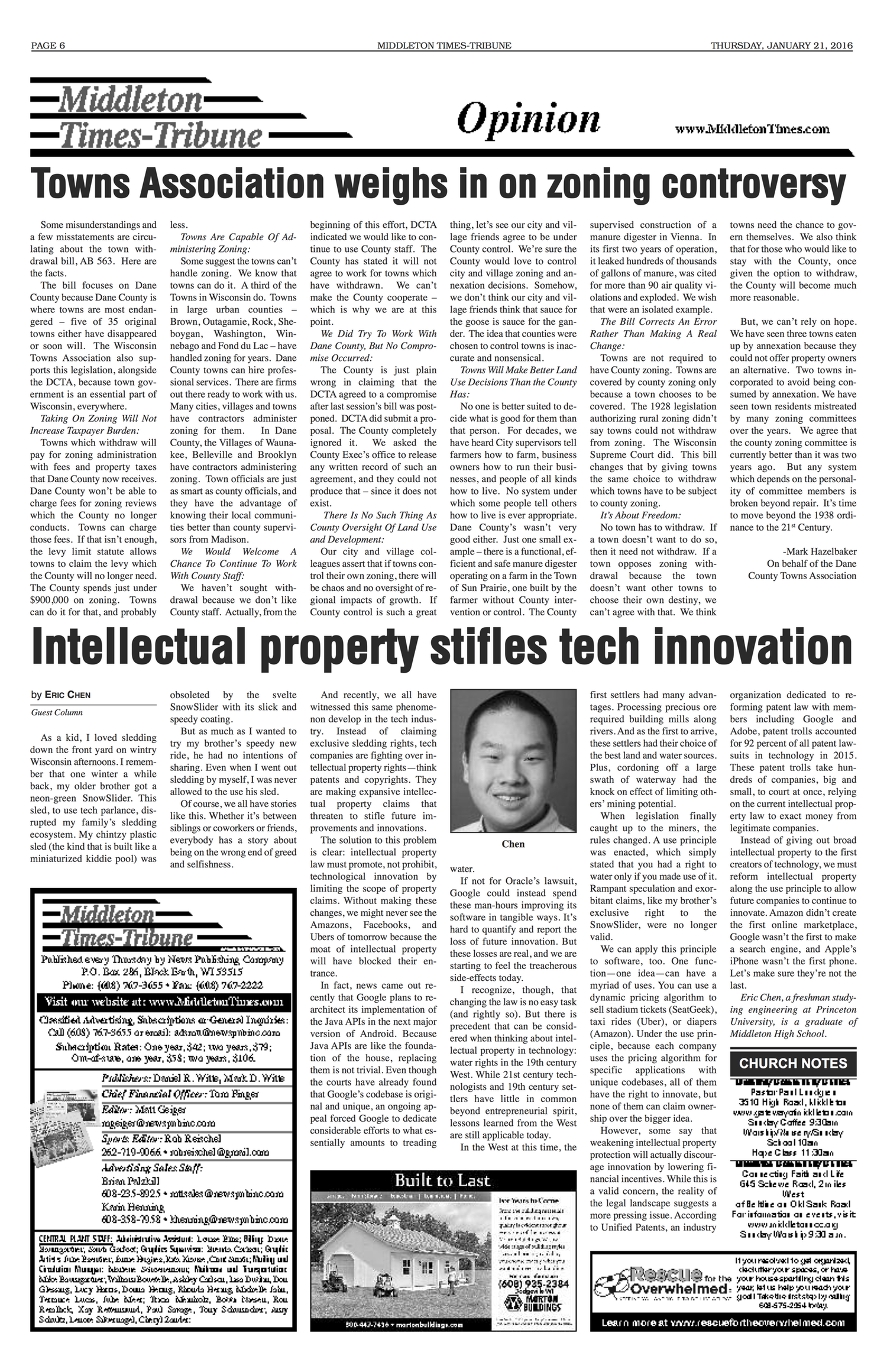Intellectual Property Stifles Tech Innovation
July 31, 2016 | 4 min read
Note: This op-ed was originally published on page six of the January 21, 2016 print issue of the Middleton Times-Tribune. This 750-word piece is the distillation of a much longer research paper I wrote for my college freshman writing seminar, Property, Wealth, and Equality.

As a kid, I loved sledding down the front yard on wintry Wisconsin afternoons. I remember that one winter a while back, my older brother got a neon-green SnowSlider. This sled, to use tech parlance, disrupted my family’s sledding ecosystem. My chintzy plastic sled (the kind that is built like a miniaturized kiddie pool) was obsoleted by the svelte SnowSlider with its slick and speedy coating.
But as much as I wanted to try my brother’s speedy new ride, he had no intentions of sharing. Even when I went out sledding by myself, I was never allowed to the use his sled.
Of course, we all have stories like this. Whether it’s between siblings or coworkers or friends, everybody has a story about being on the wrong end of greed and selfishness.
And recently, we all have witnessed this same phenomenon develop in the tech industry. Instead of claiming exclusive sledding rights, tech companies are fighting over intellectual property rights—think patents and copyrights. They are making expansive intellectual property claims that threaten to stifle future improvements and innovations.
The solution to this problem is clear: intellectual property law must promote, not prohibit, technological innovation by limiting the scope of property claims. Without making these changes, we might never see the Amazons, Facebooks, and Ubers of tomorrow because the moat of intellectual property will have blocked their entrance.
In fact, news came out recently that Google plans to re-architect its implementation of the Java APIs in the next major version of Android. Because Java APIs are like the foundation of the house, replacing them is not trivial. Even though the courts have already found that Google’s codebase is original and unique, an ongoing appeal forced Google to dedicate considerable efforts to what essentially amounts to treading water.
If not for Oracle’s lawsuit, Google could instead spend these man-hours improving its software in tangible ways. It’s hard to quantify and report the loss of future innovation. But these losses are real, and we are starting to feel the treacherous side-effects today.
I recognize, though, that changing the law is no easy task (and rightly so). But there is precedent that can be considered when thinking about intellectual property in technology: water rights in the 19th century West. While 21st century technologists and 19th century settlers have little in common beyond entrepreneurial spirit, lessons learned from the West are still applicable today.
In the West at this time, the first settlers had many advantages. Processing precious ore required building mills along rivers. And as the first to arrive, these settlers had their choice of the best land and water sources. Plus, cordoning off a large swath of waterway had the knock on effect of limiting others’ mining potential.
When legislation finally caught up to the miners, the rules changed. A use principle was enacted, which simply stated that you had a right to water only if you made use of it. Rampant speculation and exorbitant claims, like my brother’s exclusive right to the SnowSlider, were no longer valid.
We can apply this principle to software, too. One function—one idea—can have a myriad of uses. You can use a dynamic pricing algorithm to sell stadium tickets (SeatGeek), taxi rides (Uber), or diapers (Amazon). Under the use principle, because each company uses the pricing algorithm for specific applications with unique codebases, all of them have the right to innovate, but none of them can claim ownership over the bigger idea.
However, some say that weakening intellectual property protection will actually discourage innovation by lowering financial incentives. While this is a valid concern, the reality of the legal landscape suggests a more pressing issue. According to Unified Patents, an industry organization dedicated to reforming patent law with members including Google and Adobe, patent trolls accounted for 92% of all patent lawsuits in technology in 2015. These patent trolls take hundreds of companies, big and small, to court at once, relying on the current intellectual property law to exact money from legitimate companies.
Instead of giving out broad intellectual property to the first creators of technology, we must reform intellectual property along the use principle to allow future companies to continue to innovate. Amazon didn’t create the first online marketplace, Google wasn’t the first to make a search engine, and Apple’s iPhone wasn’t the first phone. Let’s make sure they’re not the last.